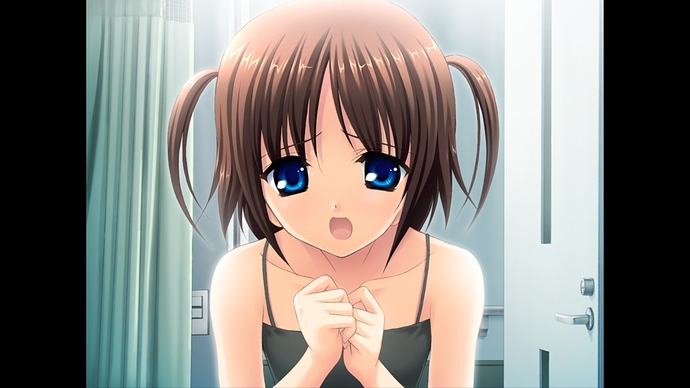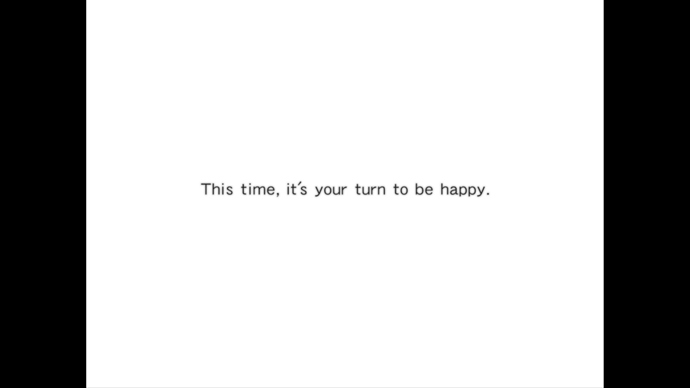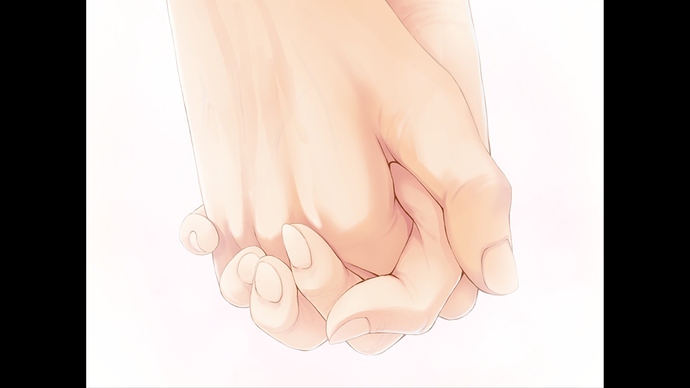Sure they’re not from Dungeons and Takafumis?
I’m not, actually… My bad for jumping to conclusions and potentially spoiling someone. 
They are, indeed, from D&T. You get them once you complete the game.
So, while the beggining and the end of this route are shocking, the majority of it is just repeating what we already know happened on Clannad, and while this could make this novel a standalone from it so that if you haven’t read Clannad you could still play this novel, for me, it was just… oh god how long is this.
However, Tomoyo After’s ending was unbearably bittersweet for me, and seeing how much Tomoyo had to wait was, just cruel.
WOW I’m so impressed by this game. I remember over 10 years ago when it came out and learned the Opening, Light Colors, hoping one day I could play it (I’m not fluent in Japanese). I wasn’t expecting the quality of the game to be this good. I have to say, I enjoyed this leagues over Rewrite when it came to character arcs. I remember knowing the ending and wondering why they changed it, I can see once you play it, it’d be way too depressing otherwise. I wish they made more spin offs with certain characters that would be this level (heard Kud Wafter was weak).
All I can say is, I hope they make an anime version somehow. I know it’s really late in the game, but Planetarian got one so…there is hope! But, I think some of the magic behind Clannad the anime for lots of non players, was the studio Kyoani. I wish they’d consider doing more KEY.
It’s been a few weeks since I had finished Tomoyo after, but only after listening to the podcast did I decide to post my thoughts here.
Forgive me for not reading through the entire topic first, like I usually do.
I won’t say it’s my least favorite Key VN or that I didn’t like it. While reading through some of its parts, parts of the After Arc included, was somethimes hard, I still like it as a whole and I completely acknowledge this story’s powerful messages. Nevertheless, to me, personally, this VN is the anti-Little Busters.
Life is tough, which no Key VN ever tried to deny and I’m pretty sure they never will. Some people are more fortunate than others. Some people have it really rough. Some people are broken, some people give up and some people pull themselves together to struggle against the hardships of life once again, and some people reach out to others, support and sometimes even save them.
But there’s no guaranteed result for any of those people.
Even if you have had a really tough childhood. Even if you work your hardest to find and maintain your place in the world. Even if you surround yourself with great people. Even if you generously share all your free time with others, even if you do everything in your power to save them. Even if you are the best person you could possibly be. Even if you always make the right decisions…
… in the end, your only reward may be death.
And the After Arc brutally hammers that in. There is no Key magic in Tomoyo After. Effort does not necessarily get rewarded. To put it simply, that’s life. But it still has meaning, it’s still wonderful. And all that’s left for us is to understand and accept all of that.
I’m just not sure I can.
Personally I actually really enjoyed the ending of Tomoyo After, I feel it’s easily the best part of the game and also has some of the most emotional segments I’ve read in a Key story thus far. I wasn’t very fond of the twist involving Tomoya’s memories at first, but I feel the buildup to it as well as the conclusion were masterfully done, albeit a little hard to believe for me. I really enjoyed the “lead up” to the surgery as well, but I felt a lot of characters fizzled out in this section of the story in terms of their importance, I understand that this section of the story belonged to Tomoyo and Tomoya’s relationship, but I feel bad not getting to know any more about characters like Tomo after this outside of the fact that she grew older, maybe i’m too attached, but I would have loved to have seen more involving Tomo after her “departure” from the family, see how she developed without their care, but I understand why it wasn’t done, this wasn’t her story, this was Tomoyo’s.
When I got to the conclusion, I was actually left with many questions to what the end-game meant for this story. Did Tomoya survive the surgery? Was Tomoyo regretful of her choice to have Tomoya partake in that surgery? What was Tomoyo’s relationship with other “family” members after these events? But then I realized, that wasn’t the point. The ending was meant to encompass the message that “time” meant nothing and that it was the quality of that time that truly meant something in the long run. Tomoyo did live a Wonderful Life, she surely did, as she was able to spend her life with Tomoya by the end of his and she took those lessons to help others in need of getting that message.
The game actually impacted me immensely with its ending, I was fresh off finishing After Story and wasn’t expecting much out of Tomoyo After (even though Tomoyo was my 2nd favorite heroine in Clannad), but it definitely made me contemplate the importance people can have on somebodies life even if its cut somewhat short. Time is precious, but in the end of the day, it’s the quality of that time that truly matters, Tomoyo did live a happy life and Tomoya’s “death” (up for interpretation) made it possible for the reader to realize that message. It was bittersweet, but it was a great way on expanding upon the original Clannad’s message about family. It was a unique way of approaching it, which is all I could have hoped for from this game, just an absolutely magnificent conclusion to a game I adored!
Now that’s one message that I’m glad you brought up  I feel like you were able to embrace that message at the end pretty thoroughly. It’s a wonderful life, so let’s make the most of it!
I feel like you were able to embrace that message at the end pretty thoroughly. It’s a wonderful life, so let’s make the most of it!
I just finished Tomoyo After yesterday, and I can honestly say it changed my life. This is perhaps my favorite part of any Key novel. Romance and drama swirl together into perfection that is the epitome of what Key is to me. I cried harder here than in any other Key work, and loved the callbacks to Clannad and the resolution with Naoyuki.
The Ancient Greeks divided love into four types- Storge (Family), Philia (Friendship), Eros (Romance), and Agape (Unconditional). I believe these correspond to the four arcs. Tomoya’s route is Eros; it establishes his loving relationship with Tomoyo and his drive to become better for her. Takafumi’s arc is Philia; the main drive here is to confront his past with his coach, whom he idolized as he helped Takafumi make friends and learn how to live. Tomo’s arc is Storge; the entire focus is bringing her and her mother together. Finally, After arc is Agape; Tomoyo sacrifices three long and painful years for a small chance to save Tomoya. Her devotion to him is beautiful and heartwrenching, and really drives home the themes of Tomoyo After to me; love, hope, and valuing the time we have in our lives. She ceased to live for herself, and instead lives for Tomoya. In the end, she recognizes him as her treasure and becomes a better person from her time with him, helping others deal with their grief and uncertainty in this world, continuing to live for others.
When I’m feeling down or lost in life, I’ll be sure to remember that Tomoyo is accompanying me and all of us on the other side of the screen, helping us find our treasure in this wonderful life. Thanks guys.
The four loves was something that came up a lot in Harmonia discussion, surprised to see it came through here too! You’re right, it does fit surprisingly well into the four arcs.
Thanks for sharing! I’m glad Tomoyo After impacted you so much. I’d love to hear your thoughts on our After Arc podcast.
Funny you should share the podcast, I just finished listening to it the third(?) time yesterday. As usual the bookclub provides great insight and critical thought that can only be gained from group discussion. I was amazed at how many scenes were added in the newer versions of the novel, and I know for sure I wouldn’t have enjoyed it without the buildup to Tomoya’s amnesia and the week where Tomoyo gave up. I agree with Karifean in that Tomoyo After is the epitome of what Key is and does to me, and I’ve come to realize that no message can hit me harder than if it is wrapped in the beauty and magic of a Key novel.
Most of my lingering thoughts and issues are with the final arc, so this is probably a good place to put them. I think I setup my thought process well enough in original route’s Clannad thread, but this still might be run a tad long once again, so sorry in advance.
I would like to say first that it isn’t lost on me how awesome it is that this game even exists. Although I would have been perfectly fine with how the original route ended, the fact that I got to spend even more time is this world with a character I thoroughly enjoy was incredible. I never imagined that a somewhat minor character from the anime would end up having such a strong impact on me in the VNs, or get this much time and attention with a spin-off. I would have predicted an After-After Story before this ever even entered my mind. It was an incredible ride, and for that, I’m thankful.
I’m going to draw a few comparisons to Mass Effect 3, mainly to show examples for a few choices (and lack of a choice) that I take issue with, and just as a general mention for one of my praises of the game, as both of their endings have left lasting impacts on me. Those spoiler tags will be explicitly mentioned, but most of them should be quick comparisons and not really essential to my overall thoughts if you haven’t played it/are planning to.
I guess I’ll start out with my one small issues with the Tomo Arc, as I loved everything up this point and really don’t have any glaring issues with them, which is: It’s super odd to me that the “Pursue Her” option is even an option at this point in the game.
It immediately reminded me of ME3: (ME3 spoiler incoming >>) You have this “verbal boss battle” with The Illusive Man, and in it you can straight up tell him “Nah, Reapers are bad, can’t trust them, gotta go kill em’” but then turn around and pick the Control ending? I suppose in that context it still makes sense because obviously the Reapers don’t want to be destroyed and leave the option there to simply survive or trick you later, but I just have to imagine that even if I tried to do that, my Shepherd, and all his/her experiences up to that point, would be saying: “No, I can’t trust them. In fact, I can’t even trust the Destroy option really, but I have to try that anyway, otherwise this was all for nothing.”
I found it odd that this isn’t one of those choices where Tomoya speaks up and says “No, actually I shouldn’t do that.” In fact, I feel like I remember that happening early on in Clannad at the beginning of (what I assume is) Nagisa’s arc where she waits at the basketball court in the rain, and even if you pick the uninterested/not going to check on her option, you still end up going anyway. (Correct me if I’m wrong.)
The idea that Tomoya can completely abandon all his principals up to that point is a little shocking and really out of place. Especially since there isn’t a “Do the Surgery, Don’t Do the Surgery” Option. Yes, not doing the surgery would be really awful to Tomoyo, but at least it would make some bit of sense comparatively and contextually, and considering the progress made during that week, the possibility of recovery at least seems plausible at that point (even if nothing came of it). I assume the reason there isn’t one is that now that he has rediscovered his love for Tomoyo, he can’t put her through that again, which again, makes total logical sense given his thought process up that point, and why having a little tryst in the woods clearly doesn’t.
My only other major complaint is the fact that this arc almost completely leaves the realm of believeability that the entirety of this tale was told through up to this point. As I mentioned in the Tomoyo Route Bookclub Thread for Clannad, I was able to connect on a deep level with the Tomoyo route because I had very similar personal experiences and emotional struggles (IE: Tomoya’s self doubt, and both of their lonliness, the act of the breakup scene, etc.), which hit me particularly hard in the break up scene. Generally, I do tend to enjoy fiction or such more when I can directly connect as opposed to partially. I couldn’t connect with Tomoya’s amnesia, especially because it immediately came off as forced plot device (and why by comparison I’m particularly interested in LB!, since Riki’s narcolepsy in the anime seemed more of a thematic device to show why his friends and their patience and understanding is so important to him.)
Finally, the last “afterlife” scene (which is how I interpreted it) is probably what pissed me off the most. I really can’t think anything much more terse and unsatisfying than the “It’ll all be ok in the afterlife” kind of ending. It didn’t bother me that it was sad; it bothered me because it initially felt boring and cheap.
Also, I felt like it would have been to nice actually have seen and been apart of their final conversation (I tend to prefer “show, don’t tell”). I think it might have given some better closure, but maybe that’s just me. That being said, with some awesome interpretations by other people in this thread, my issue with the afterlife thing has been mostly forgiven, and I can say with certainty that despite my personal feelings, I cannot legitimately call this a “bad ending”.
I’m going to swing back to Mass Effect one more time, because the way I got over the ME3 ending was actually the same as how it happened here. I remember hearing someone talking about it on a podcast and say “It’s about the journey, not the destination”. The idea that although it was a short time, it was still a wonderful time (the quality of time > amount of time interpretation) is honestly the one that has given me the most closure. The fact that it was an amazing journey: the memories, the bumps in the road, the pain from the scrapes on your hands and knees, and the eventual view from the obstacles you climb: That’s that was ultimately important, not the destination or the final moment. Special thanks to @VNSalesman! That was exactly what I needed to hear. One awful moment shouldn’t ruin a lifetime of great ones, and I’m determined to remember that going forward.
EDIT: I did just want to clarify (because I think I took on a little too much here at once and didn’t clearly explain myself as well I hoped) that the amnesia plot point shattered my exception (or my bias) up to that point of how grounded and real everything that had happened to that point felt. I’m not saying I wanted to be able to personally understand or emphasize with Tomoya’s amnesia, which is how it comes off based on how I described my thoughts on the previous conflicts. The point I wanted to make but didn’t say properly was that it immediately pulled me out of the experience in a negative way, and I was never able to really properly reconnect with the rest of the game at that point, which colored my thoughts going forward and caused my issues with the ending as a whole. I also improperly used “forgive” here. I should have said something to the effect of: “Because I wasn’t able to suspend my disbelief of the amnesia, I couldn’t appreciate anything else that happened, and therefore didn’t even really give it a chance and instead got really bummed out because my expectations weren’t met.” Hence how I got here, read some other interpretations, and viewed it in a new perspective, changing my opinions of the ending. I initially thought if they showed the final conversation between them that would have provided the closure I didn’t feel initially with the ending. I did want to keep those parts in because they were reflective of my experience with that game and relevant to how I reached my final thoughts, but I think it made my post more unclear and contradictory. I’m not going to edit it anything out or add any further, but it will remind me to chill out and be a bit more clear and concise. I almost deleted the post shortly after putting it up, but now I’m glad I didn’t.
Yeah, using these kind of plot devices has this risk, but it allows the writer to throw shit at their characters and see how they react. However, the thing here is that you don’t necessarily have to connect with Tomoya. Connecting with Tomoyo is more than enough. At first you don’t know that they amnesia is this kind of loop that repeats over and over again, so you just think that it’s gonna be hard, but the relationship will recover eventually.
After seeing the hard time that both Tomoya and Tomoyo are having, you start realizing that this situation really sucks for Tomoyo. And only then, you are told that this is a problem that will potentially never get solved and that Tomoyo is stuck with abandoning the person she loves or suffering forever with him.
so my point is: the amnesia or connecting with Tomoya here isn’t important. What is important is that you connect with Tomoyo, or that at least that you understand that she is in a difficult situation that can’t be optimally solved.
Yeah, a better closure would’ve been great. The VN would’ve left you a really nice feeling. But having a vague ending incites you to think about what happened, what could’ve happened, what it means…
And in the long run, when you remember reading this VN, I hope that you’ll realize that a vague ending is not an issue that you forgave as you said, but rather, a nice and positive way to end the VN.
So, does Tomoya actually die or not at the end of the VN? I mean, in the original release of the VN (the 18+ adult PC release that came in 2005, the first, original version of the VN), it was confirmed (or at least implied heavily) that Tomoya died from the complications of the surgery (of course, I’m not sure if I’m right on that). There were likely clues in the epilogue that showed that he died, such as Tomoyo sharing her story in the Internet.
However, in the Memorial Edition (the version of the VN that the English Edition was based on, but the English release does have some new content, but it’s likely from the version it’s based off of), the added scene after the credits finish puts into question on Tomoya’s death. Did he really die or was he just in a coma and woke up to reunite with Tomoyo after being released from the hospital, leading to the added scene (of the two holding each other’s hands)? Again, there are interpretations of this and we may never know which is the right one, correct? Again, we don’t know due to that added scene that the Memorial Edition (and thus 2016 English Edition) had, it’s speculation now.
Also, has anyone heard of the manga adaptation of the VN? Anyone read it?
I believe he does. They made the ending much more vague in later editions, but if Tomoya lives, the entire message of After Arc is less impactful: continuing to live and cherish life, no matter how painful it may be.
For me personally the message would already be plenty impactful even with Tomoya surviving/waking up after a long coma. Because even then Tomoyo went through a lot of suffering, and while it can be argued Tomoya dying makes the message even more “powerful” it’s a bit too much for me personally. I just can’t deal with endings like that emotionally lol. I just want the characters I care about to be happy in the end.
Either way, the later versions of Tomoyo After basically leave the ending open to interpretation, so everyone can view it however they like.
That’s true, Tomoya dying right by Tomoyo’s side does make the message of After Arc more impactful, to continue to live and cherish life, no matter how painful it may be. However, we don’t actually know if Tomoya dies or not due to the ending being very vague, even in later editions. I mean, it’s based on speculation on whether he’s dead or not, but Tomoyo still became a stronger person from Tomoya dying or close to dying. The experience Tomoyo went through made her stronger as shown when she’s sharing her story sometime after Tomoya’s ‘death’(?) to help others. Again we don’t know if he died. The original release had him die, I think (the manga adapted this release). What do you think, Zosonte?
I’m pretty confident in saying he’s dead, as it makes for a greater story both as an individual VN and as part of the CLANNAD loop, however I don’t think it ultimately matters; either way the result is the same, and Tomoyo became a greater person through it.
What do you mean when you said that the result is the same either way? I mean, it makes sense for Tomoya to die and Tomoyo becoming a greater person through it, but we don’t know since the ending’s vague. I agree with you that Tomoya is dead, which makes for a great story both as an individual VN and as part of CLANNAD. Again, speculation at best. Not ultimately mattering, huh. Can you explain this more?
As I said, the result is the same regardless of it Tomoya lives or not. The improvements we see in the credits, and the change in mindset we see from Tomoyo (both during and after the ‘death’) are all admirable and yet extrinsic to the death of Tomoya. Losing Tomoya’s life is not what sets these changes into motion - The actions of Tomoya and Tomoyo throughout the VN are.
The key change that makes the ending so beautiful is Tomoyo’s reflective realization that no matter what the future holds, life is beautiful. The second big change is in Tomoyo sharing the story and trying to spread a message. Both of these changes would have happened even if Tomoya lived.



